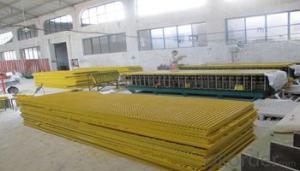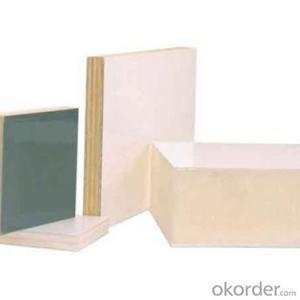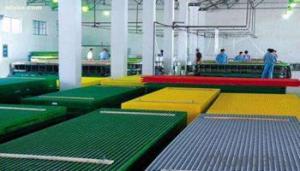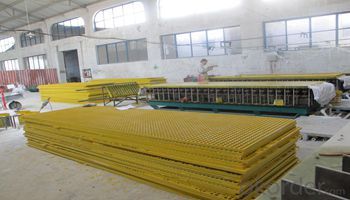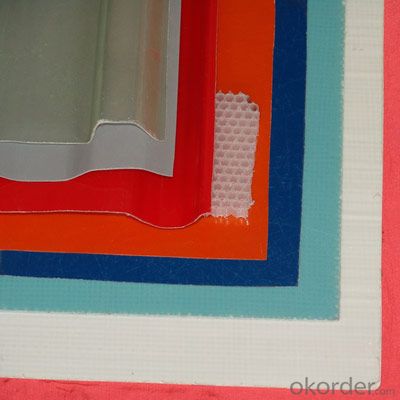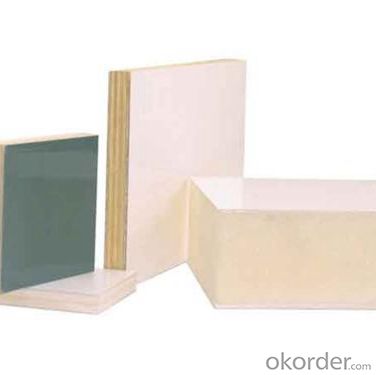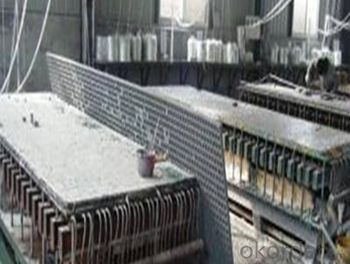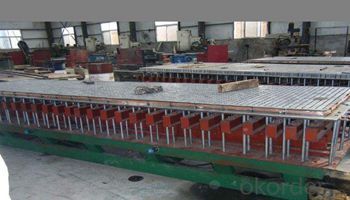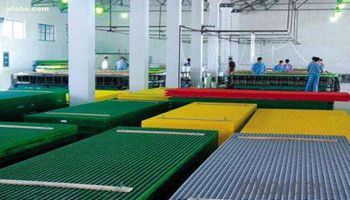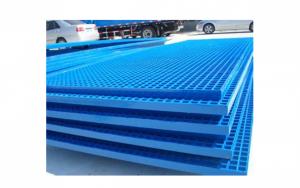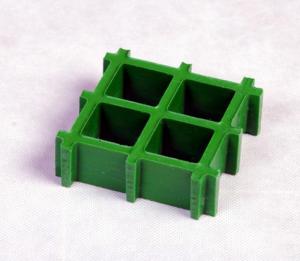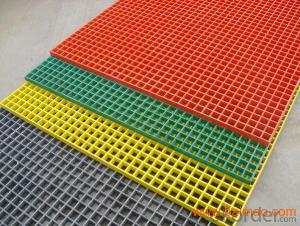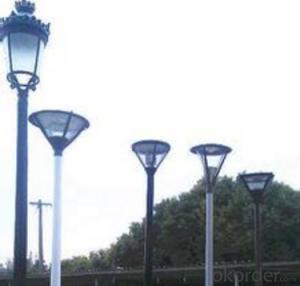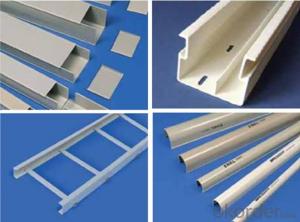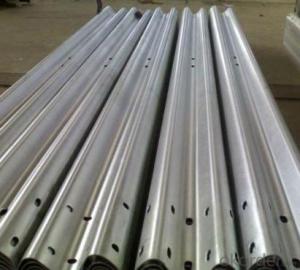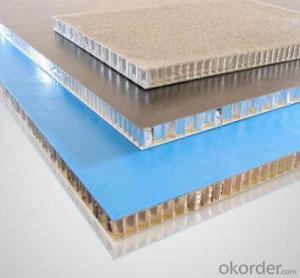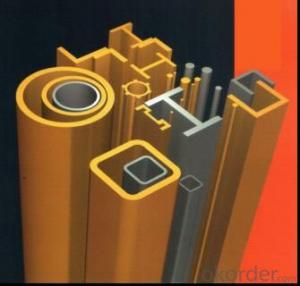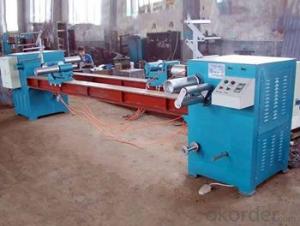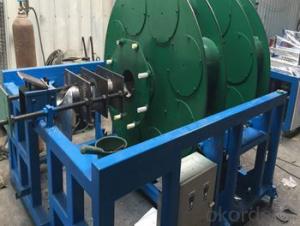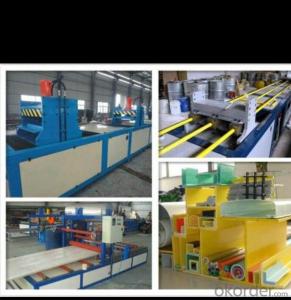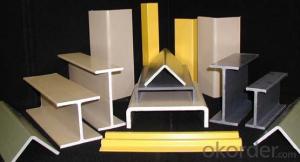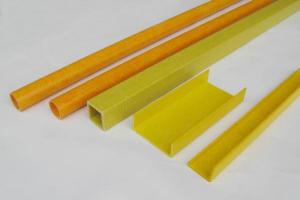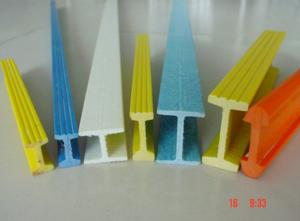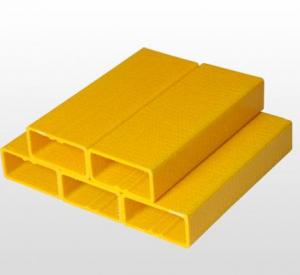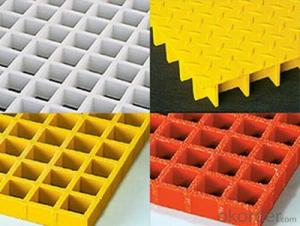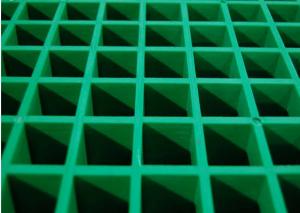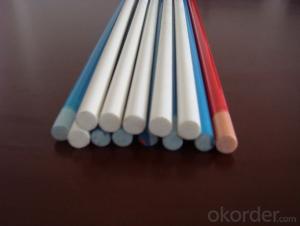FRP Pultrusion Profiles - Lightweight, High Strength, and High Quality FRP Pultruded Grating
- Loading Port:
- Tianjin
- Payment Terms:
- TT OR LC
- Min Order Qty:
- 20000 m.t.
- Supply Capability:
- 50000 m.t./month
OKorder Service Pledge
OKorder Financial Service
You Might Also Like
Specification
PRODUCT DESCRIPTION
Pultruded grating is made by a particular assembly process, which using “I” shape as its main load-bearing and special rod to go through the bearing bar. Pultruded grating include the standard grating and the custom grating, the custom grating can be designed to meet customer’s requirement or special using condition by changing the shape, size and space of the bearing bars, the surface can be covered with lozenge panel, grit panel, or added the anti-slippery sand directly.
FRP pultruded grating has the most characteristics of molded grating, but it has its distinct advantages, it has very high fiberglass content in the loading direction, so it has very high load capability, it has more superiority when used at wide span, so that the basic support will be decreased and the project cost will be reduced accordingly.
SPECIFICATION
Thickness (mm) | Bar width (mm) | Open space (mm) | Open rate (%) | Approx weight (kg/m |
25.4 | 15.2 | 22.8 | 60 | 13.2 |
25.4 | 15.2 | 15.2 | 50 | 15.9 |
25.4 | 15.2 | 10.1 | 40 | 18.5 |
25.4 | 40 | 10.8 | 21 | 14.5 |
38.1 | 15.2 | 22.8 | 60 | 15.8 |
38.1 | 15.2 | 15.2 | 50 | 19.1 |
38.1 | 15.2 | 10.1 | 40 | 22.4 |
50.8 | 25.4 | 25.4 | 50 | 16.6 |
50.8 | 25.4 | 12.7 | 33 | 21.1 |
FEATURES
a. Anti-corrosion and anti-rust
b. Light weight and high strength
c. Anti-flammable
d. Anti- fatigue
e. Safe and anti-slippery
f. Anti-ageing
g. Easy of maintenance
h. Excellent electromagnetism property
i. Good economic benefit
FIELDS SERVED
Sewage treatment,
water supply and drainage,
chemical industry,
oil industry,
power engineering,
pulp and paper,
construction engineering,
spinning, marine engineering.
APPLICATION
Operation terrace,
stair walkway,
ground floor,
trench cover,
sidewalk,
foot bridge,
equipment safety fence,
scaffold.
COMPANT DESCRIPTION
CNBM,China National Building Materials Group is a state-owned enterprise in charge of administrative affairs in china building materials industry. Established in 1984, CNBM is a large group corporation of building materials with total assets of 25 billion RMB and a total staff of 30,000.CNBM now owns 200 subordinating firms of solely owned and joint-venture companies.
CNBM International Corporation is one subsidiary of CNBM, we focus on offering good-quality products,professional service and complete solution to our customers. Strong delivery capacity, advanced technology& management, strong financing capability and excellent after-sale service are our advantages in sharing international market.
FAQ
1.Q:Are you factory or trading company ?
A:We are Factory produce FRP machines and FRP products.
2.Q:If can customized by customers requirements?
A:yes,we can produce the machine with customized size.
3.Q:How about the payment?
A:We accept any kind of payment.
4.Q:What is the guarantee?
A:Gurantee is one year.
5.Q:If you can training?
A:yes ,we can training in our factory also can send engineers to your factory training.
PICTURES
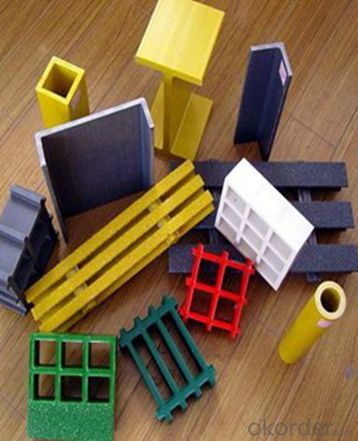
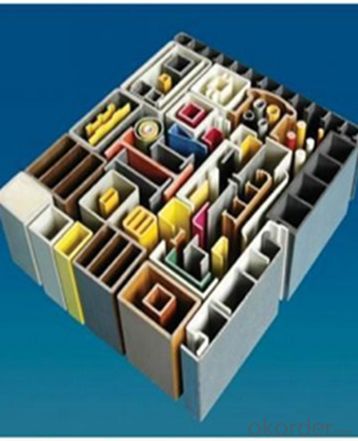
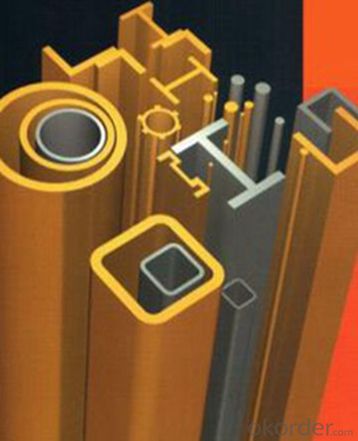
- Q: How do FRP pultrusion profiles perform in earthquake-prone areas?
- FRP (Fiber Reinforced Polymer) pultrusion profiles perform exceptionally well in earthquake-prone areas due to their inherent properties. The high strength-to-weight ratio of FRP materials provides excellent resilience against seismic forces. Additionally, FRP pultrusions have high flexural strength, which enables them to withstand bending and torsional loads during earthquakes. Moreover, FRP profiles are corrosion-resistant, making them ideal for long-term durability in areas prone to seismic activity. Overall, FRP pultrusion profiles offer a reliable and robust solution for structural applications in earthquake-prone regions.
- Q: Can FRP pultrusion profiles be used in the construction of railway sleepers?
- The use of FRP (Fiber Reinforced Polymer) pultrusion profiles is indeed possible in the construction of railway sleepers. These profiles possess a range of advantages that render them suitable for this particular application. To begin with, the lightweight yet robust nature of FRP pultrusion profiles makes them an ideal option for railway sleepers. They boast high strength-to-weight ratios, enabling them to withstand heavy loads and reliably support the weight of trains. Moreover, their lightweight constitution facilitates transportation and installation, thereby reducing construction time and costs. Additionally, FRP pultrusion profiles exhibit a high resistance to corrosion, a crucial aspect for railway sleepers. Unlike traditional materials such as wood or steel that are prone to corrosion when exposed to moisture and chemicals, FRP profiles are non-corrosive. Consequently, they do not necessitate regular maintenance or replacement due to rust or decay. Furthermore, these profiles offer exceptional durability and longevity. They can withstand UV radiation, extreme temperatures, and chemicals, ensuring a longer lifespan compared to conventional materials. As a result, the need for frequent replacements is minimized, leading to reduced maintenance and lifecycle costs. Moreover, FRP pultrusion profiles can be tailored to meet specific design requirements. They can be manufactured in various shapes and sizes to accommodate different railway sleeper designs, providing flexibility in construction. Additionally, they can be produced in different colors, allowing for aesthetic customization. Lastly, FRP pultrusion profiles possess excellent electrical insulation properties, a critical factor for railway sleepers. They are capable of providing insulation between the train tracks and the ground, preventing electrical interference and ensuring safe operation. In conclusion, FRP pultrusion profiles are a suitable choice for constructing railway sleepers due to their lightweight yet strong composition, corrosion resistance, durability, customization options, and electrical insulation properties.
- Q: How do FRP pultrusion profiles compare to fiberglass reinforced panels (FRP)?
- FRP pultrusion profiles and fiberglass reinforced panels (FRP) are commonly utilized materials in various industries due to their high strength and durability. However, there are notable distinctions when comparing these two FRP products. 1. Manufacturing Process: FRP pultrusion profiles are produced using a continuous pultrusion process. Fibers are pulled through a resin bath and then cured using heat or ultraviolet light. As a result, a solid and uniform profile with consistent mechanical properties is achieved. In contrast, fiberglass reinforced panels are created by combining layers of fiberglass mat and resin, typically through molding or pressing. This process can occasionally lead to variations in thickness and mechanical properties across the panel. 2. Structural Strength: FRP pultrusion profiles are renowned for their exceptional strength-to-weight ratio. The continuous fiber reinforcement utilized in pultrusion provides high stiffness and load-bearing capacity, making them suitable for structural applications. Conversely, while fiberglass reinforced panels are also strong, they may not possess the same level of structural integrity as pultrusion profiles due to the potential for variations in resin content and fiber distribution. 3. Design Flexibility: FRP pultrusion profiles offer greater design flexibility compared to fiberglass reinforced panels. The pultrusion process allows for the incorporation of various shapes and configurations, such as I-beams, angles, tubes, and custom profiles. This versatility enables engineers to tailor the profiles to specific project requirements. In contrast, fiberglass reinforced panels are typically limited to flat or slightly curved surfaces and do not provide the same level of customization. 4. Surface Finish: FRP pultrusion profiles generally have a smooth and consistent surface finish due to the pultrusion process. This makes them more aesthetically appealing and suitable for applications where appearance is important. In contrast, fiberglass reinforced panels may have a textured or uneven surface, which can impact their visual appeal in certain applications. 5. Cost: In terms of costs, FRP pultrusion profiles are generally more expensive than fiberglass reinforced panels. The pultrusion process requires specialized equipment and incurs higher manufacturing costs. Conversely, fiberglass reinforced panels have lower production costs due to their simpler manufacturing process. However, it is essential to consider the specific application requirements and long-term performance when evaluating the cost-effectiveness of these materials. In summary, FRP pultrusion profiles and fiberglass reinforced panels have distinct characteristics and advantages. The choice between the two depends on factors such as structural requirements, design flexibility, surface finish, and cost considerations.
- Q: Are FRP pultrusion profiles impact resistant?
- FRP pultrusion profiles are widely recognized for their exceptional impact resistance. By combining reinforcing fibers like glass or carbon with a polymer matrix, they become intrinsically sturdy and long-lasting. The pultrusion process further bolsters their impact resistance by aligning the fibers in the direction of the load, providing optimal strength against impacts. Additionally, these profiles boast a remarkable strength-to-weight ratio, enabling them to withstand heavy impacts without significant damage or deformation. This characteristic makes them ideal for industries like construction, transportation, and infrastructure, where impact resistance is vital. Furthermore, FRP pultrusion profiles exhibit outstanding resistance to corrosion, chemicals, and UV radiation, enhancing their durability and long-term performance. Even in harsh environments, they maintain their impact resistance properties, making them the preferred choice for various sectors. Nonetheless, it is crucial to acknowledge that the impact resistance of FRP pultrusion profiles can vary depending on factors like design, composition, and manufacturing process. To ensure the profiles meet the desired impact resistance requirements for a specific application, it is advisable to consult with the manufacturer or supplier.
- Q: Can FRP pultrusion profiles be customized or tailored to specific project requirements?
- Yes, FRP (Fiber Reinforced Polymer) pultrusion profiles can be customized or tailored to specific project requirements. Pultrusion is a manufacturing process that allows for the creation of continuous fiber-reinforced composite profiles with a high level of design flexibility. The specific requirements of a project, such as dimensions, shapes, and mechanical properties, can be accommodated by adjusting the design and manufacturing parameters. The customization process begins with understanding the project's needs and specifications. This includes determining the desired profile dimensions, cross-sectional shape, and mechanical properties such as strength, stiffness, and durability. Based on these requirements, engineers and manufacturers can develop a tailored solution. The customization of FRP pultrusion profiles can be achieved through various means. Firstly, the choice of reinforcement materials, such as fiberglass, carbon fiber, or aramid fiber, can be selected based on the desired mechanical characteristics. The orientation and volume fraction of the fibers can also be adjusted to optimize the strength and stiffness of the profile. Additionally, the resin matrix used in the pultrusion process can be customized to enhance specific properties, such as fire resistance, chemical resistance, or UV resistance. Various resin systems, including polyester, vinyl ester, or epoxy, can be utilized to meet the project's requirements. Furthermore, the pultrusion process allows for the incorporation of additional features during manufacturing. This includes adding inserts, fastener holes, grooves, or other structural details to the profile. These modifications can be tailored to the specific project requirements, ensuring compatibility with the overall design and assembly. Overall, FRP pultrusion profiles offer a high degree of customization and tailoring to meet specific project requirements. This versatility makes them a popular choice in various industries, including construction, infrastructure, aerospace, and automotive, where lightweight, durable, and corrosion-resistant materials are needed.
- Q: Are FRP pultrusion profiles resistant to fungal growth?
- Yes, FRP (Fiber Reinforced Polymer) pultrusion profiles are generally resistant to fungal growth. The composite materials used in pultrusion, such as resins and fibers, are inherently resistant to biological degradation, including fungal attack. The non-porous nature of FRP pultrusion profiles also makes it difficult for fungi to penetrate and grow on the surface. Additionally, the manufacturing process of pultrusion involves curing the composite materials at high temperatures, which further enhances their resistance to fungal growth. However, it is important to note that no material is completely immune to fungal growth under all conditions. Factors such as high humidity, prolonged exposure to moisture, and poor maintenance practices may still contribute to fungal growth on FRP pultrusion profiles, although to a lesser extent compared to other materials like wood or metal. Regular inspection and proper cleaning can help maintain the fungal resistance of FRP pultrusion profiles over their lifespan.
- Q: What raw materials do FRP pultrusion require?
- Resin: commonly used unsaturated polyester resin, epoxy resin, vinyl ester resin, phenolic resin;
- Q: Are FRP pultrusion profiles resistant to chemicals used in food processing?
- The resistance of FRP pultrusion profiles to chemicals commonly used in food processing is generally high. FRP, a type of fiberglass reinforced plastic, is well-known for its exceptional chemical resistance, making it a suitable material for various industrial uses, including the food processing industry. These profiles are made by combining resins and fiberglass reinforcements, which give them inherent resistance to a wide array of chemicals. Acids, alkalis, solvents, and many other chemicals often found in food processing environments are typically resisted by FRP pultrusion profiles. This resistance ensures that the profiles will not corrode, degrade, or react with these chemicals, thus maintaining their structural integrity over time. Consequently, FRP pultrusion profiles are regarded as a dependable choice for equipment, structures, and components used in food processing facilities. However, it is important to note that the specific chemical resistance of FRP pultrusion profiles may vary depending on the resin system used in their production. Different resins offer different levels of resistance to specific chemicals. Therefore, it is crucial to carefully select the appropriate resin formulation that matches the specific chemical environment in the food processing industry. To ensure the compatibility of FRP pultrusion profiles with the chemicals commonly used in food processing, it is advisable to consult with the manufacturer or supplier. They can provide detailed information regarding the chemical resistance properties of their FRP profiles and assist in selecting the most suitable materials for the specific application. Additionally, proper maintenance and regular cleaning practices should be implemented to ensure the longevity and sustained chemical resistance of FRP pultrusion profiles in food processing environments.
- Q: Are FRP pultrusion profiles resistant to chemicals used in mining operations?
- FRP pultrusion profiles, commonly referred to as Fiber Reinforced Polymer, generally exhibit resistance to chemicals commonly used in mining operations. These profiles are well-known for their exceptional chemical resistance properties, making them suitable for a variety of corrosive environments, including mining operations. To provide resistance against the vast array of chemicals typically found in mining applications, such as acids, alkalis, solvents, and corrosive gases, the resin matrix used in FRP pultrusion profiles can be carefully selected. Additionally, the reinforcement fibers, often composed of glass or carbon, further enhance the overall chemical resistance of the profile. Moreover, FRP pultrusion profiles are non-conductive, making them an ideal choice for both electrical and mining applications. They are not susceptible to corrosion or degradation when exposed to chemicals, ensuring their durability and longevity in harsh mining environments. However, it is crucial to consider the specific chemicals and concentrations used in mining operations. Although FRP pultrusion profiles generally possess excellent chemical resistance, prolonged exposure to highly aggressive chemicals or high concentrations may necessitate additional measures. These measures could include selecting specific resin systems or applying surface coatings to ensure optimal performance and longevity. To determine the most suitable materials for specific mining chemical environments, it is advisable to consult with FRP manufacturers or experts.
- Q: Are FRP pultrusion profiles resistant to UV degradation?
- FRP pultrusion profiles typically possess strong resistance against UV degradation. These profiles, constructed from a blend of resin and glass fibers, are designed to endure extended sun exposure. The resin utilized in their production is customarily engineered to provide UV radiation resistance. This resistance effectively safeguards the FRP pultrusion profiles from the detrimental effects of prolonged sunlight exposure. Extensive testing has confirmed the exceptional UV resistance of FRP pultrusion profiles. Consequently, they are frequently employed in outdoor settings, such as construction, infrastructure, and marine industries, where they are subject to sunlight exposure. The UV resistance guarantees that these profiles maintain their structural integrity, color, and aesthetic appeal over an extended period. However, it is crucial to acknowledge that the level of UV resistance may differ based on the specific resin formulation used during manufacturing. Various manufacturers employ different resins containing varying levels of UV stabilizers. It is advisable to consult the manufacturer or supplier to ensure that the chosen FRP pultrusion profiles are specifically designed to withstand the UV conditions of the intended application. Regular maintenance and periodic inspection of the FRP pultrusion profiles are also vital to ensure their long-term UV resistance. This may involve cleaning, applying protective coatings, or utilizing UV-blocking additives if necessary. By taking these precautions, the UV resistance of FRP pultrusion profiles can be further enhanced, securing their durability and longevity in outdoor environments.
Send your message to us
FRP Pultrusion Profiles - Lightweight, High Strength, and High Quality FRP Pultruded Grating
- Loading Port:
- Tianjin
- Payment Terms:
- TT OR LC
- Min Order Qty:
- 20000 m.t.
- Supply Capability:
- 50000 m.t./month
OKorder Service Pledge
OKorder Financial Service
Similar products
Hot products
Hot Searches
Related keywords
